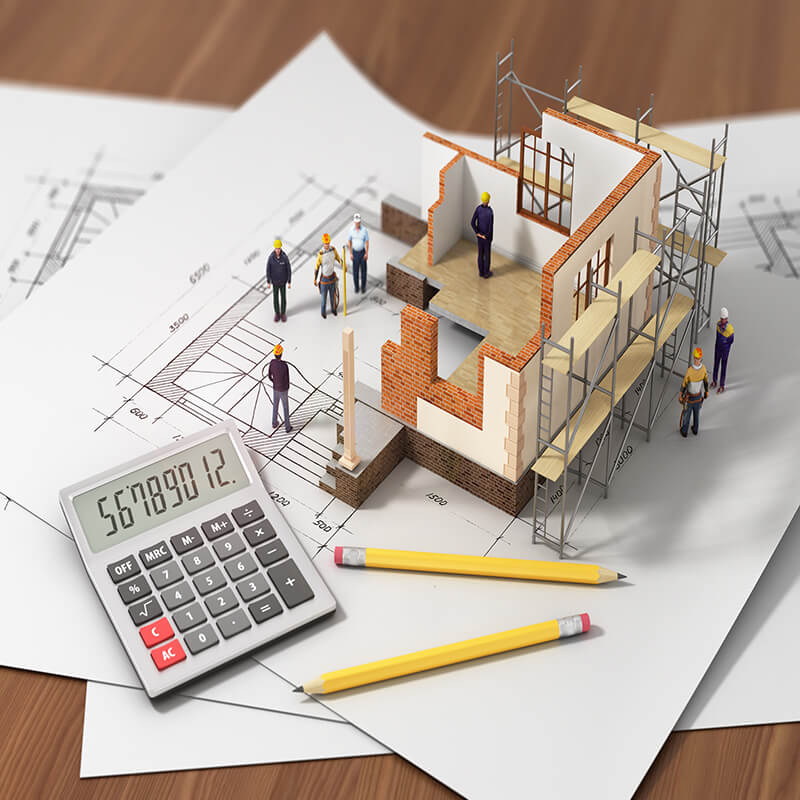GET HOME LOAN AT CHEAPEST INTEREST RATE

Own your dream home with Easy Home Loans at LoanPakka.com
Our experts will reply you with a quote very soon

What is Home Loan
A House Loan or Home Loan simply means a sum of money borrowed from Banks or NBFCs to purchase a house. People generally take a home loan for either buying a house/flat or plot of land for construction of house or renovation, extension and repair to the existing house. The property is mortgaged to the bank or the lender as a security till the repayment of the full loan amount. The Banks and NBFCs will hold the deed to the property till the loan has been paid back with the interest due on it. HDFC Bank provides Home Loan for Central Government Employees which includes HDFC Home Loan for Maharatna Companies, Mini Ratna Companies, PSUs etc. SBI provides Home Loans for Salaried, Professionals, Self Employed etc through various schemes.
We at LoanPakka offer Home Loan of various Banks and NBFCs to compare & choose cheapest i.e Home loan with lowest interest rates, processing fees and lowest foreclosure charges among all the Banks & NBFCs.
TYPES OF HOME LOAN

Home Purchase Loan
These loans are provided to the eligible customers who are seeking to purchase flat or property for the first time.

Land/ Plot Purchase Loan
Plot Purchase loan are given to the customers who want to buy plot or land for the purpose of constructing a house on it in a given period of time.

Home Construction Loan
These loans are given to the customers who are having their own land or plot and want to construct a house on it in specific time.

Home Extension/Renovation Loan
These loans are given to those customers who want to extend or renovate their existing house or property.

Balance Transfer Home Loan
Customers can transfer their loan in between if some Bank offer less interest rate on loan than existing bank. People chose their options to reduce EMI by switching to another Bank which is providing cheaper interest rate.

Home Loan Topup
It is the facility provided by some Banks & NBFCs that allows existing customers to borrow a certain amount above and over the existing Home Loan
HOME LOAN ELIGIBILITY
Your chances of getting loan will be decided by the following factors:
1. Income/ Other incomes
2. Age
3. Qualification
4. Credit Score
5. Property Value
6. Work Experience of Borrower
7. Bank Balance
8. Number of Dependants
9. Assets/ Liabilities
10. Location and Age of Property
Documents Required for Home Loan
- Complete Home Loan Application form with 2 passport size photographs
- Photo Identity Proof: Passport/PAN card/Driving Licence/Voter ID.
- Residence Address Proof: To Whomsoever It May Concern/Utility Bill/Quarter Allotment letter/Aadhaar Card.
- Income Proof: Salary slip & Form 16
- Bank Statement: Last 6 months statements.
- Property Documents: Sales Deed, Transfer of Ownership
- Advance Processing Cheque: a Cancelled Cheque for validation of Bank Account.
Documents Required for Home Loan Transfer:
- Filled Application form for loan transfer.
- Passport size photographs
- Latest 3 Months salary slips
- Six months Bank Statements (Salary Account).
- Identity Proof: Pan Card/Voter ID card/Driving Licence.
- Proof of address: Utility Bill/To Whomsoever Concerned/ Aadhaar Card.
- Proof of Age: 10th or 12th Certificate/ Pan Card/ Birth Certificate
- Bank Statement from wherein the home loan EMIs were deducted amounting to last 12 months of the account
- The loan statement copy & complete set of documents relating to the property that is currently in possession of the present home loan lender.
Other Documents Required
- Copy of plan approved for the proposed construction/extension
- Cost estimation/valuation report from Banks authorised surveyor/ evaluator.
- Allotment letter of housing board/NOC of the Society/Builder etc. as well as any other land use certificate/other.

Points to Compare Before You Apply Home Loan
Compare Interest Rates
Interest rate are one of the most important factors while taking the Home Loan. The Banks and NBFCs offer home loans in fix floating and mix rate packages. Fix rate come with specific interest rate for the entire tenure of the loan while floating rate are link to MCLR or PLR , which means that they can change during the tenure. Mix rate offer a fix rate for a specific period and floating rate thereafter. Therefore choose wisely, as they will determine your monthly EMI and overall interest amount you pay to the bank.
Compare Processing Fees
Every bank charges certain percentage on the total loan amount as processing fees also known as administrative charges. This is one time payment and it is not refundable. Processing fees can either be a fix amount or a certain percentage of the loan amount. Therefore compare and select lowest fees on platform “LoanPakka.com”.
Prepayment and Foreclosure charges
This charges are levied as a percentage of the outstanding amount when you repay your loan amount prior to the stipulated home loan tenure. Presently, RBI baned prepayment or foreclosure charges or penalties so make sure you do not pay anything extra while foreclosing or prepaying your home loan amount.
Miscellaneous Charges
One must compare other charges like late payment charges, legal fees, conversion charges, administrative charges etc. before selecting the Banks or NBFCs for Home Loan.

FREQUENTLY ASKED QUESTIONS ON HOME LOAN
Yes, It is mostly mandatory to have a Co-applicant. If someone is the co-owner of the property in question, it is necessary that he/she also should be Co-applicant for the Home Loan. If you are the sole owner of the property, any member of your immediate family can be your Co-applicant
Most lender requires 10-20% of the home purchase price as a down payment from you. It is also called ‘one’s own contribution’ by some lenders. The rest which is 80-90% of the property value is financed by the lender. The total financed amount also include registration, transfer and stamp duty charges.
The loan amount can be disburse in full or in instalments which usually does not exceed three in number. In case of a under contraction property, the disbursement of loan amount is based on the progress of your construction as assessed by the lender and not necessarily according to the developer’s agreement. Make sure to enter into an agreement with developer wherein the payments are linked to the construction work and not predefined on a time based schedule. In case of fully constructed property, the disbursement is made in full
Home Loan rates can either be fixed or flexible. In the former, the interest rate is fixed for the loan entire tenure. While in the later, the rate does not remain fixed.
Generally the lenders offer various modes for loan repayment. One may issue standing instructions to the bankers to pay the instalment through ECS (Electronic Clearance System), opt for direct deduction of the monthly instalments by your employer or issue post-dated cheque from a salary account.
One may prepay the loan ahead of its original tenure. If you are on a floating interest rate, no charge will be applicable. If you are on a fix rate, there may be a charge applicable.
Partial prepayment refers to any payment made by the borrower in addition the regular EMI. It directly reduces the outstanding principle amount and the interest gate calculated on the reduced principle amount. Prepayment helps in reducing the total interest outgo as the loan tenure get reduced. The higher the prepayment amount and the longer the period, the more will be your savings.
Every Home Loan lender is supposed to furnished you with a statement, at the beginning of the year, showing how much of the total interest and principal is expected to be repaid during the year. This statement helps you to declare the figures to your accounts departments as a declaration of investment proof for tax deduction.
It is always better to cover your Home Loan liabilities and not let it fall on your family in your absence. He may either buy a pure term insurance plan or mortgage insurance plan for amount equal to loan amount for a specific tenure. One is allowed to pay a single premium or a regular premium to buy any such plan. It is however not compulsory to buy such insurance plan while taking a Home Loan from the lender
A home improvement loan is offered to facilitate improvements of self-owned property to existing or new customers. This loan may be used for repairs, renovation improvements & extensions of the home. The loan works like, the borrower will have to work out a cost estimate of the work & give it to the lender, who will take a quotation from the contractor to verify to estimate submitted. The loan amount is released at the rate of the construction work to the contractor to whom it is due
Of the total annual EMIs, the principal amount component gets tax benefits under Section 80C of the Income Tax Act. Even the partial prepayment amount qualifies for the same but within the limit of 1.5 Lacs under Section 80C. Further, if it is self-occupied property, the interest paid is deductible upto Rs. 2 lacs in a year under section 24. However, to get the deduction under Section 24, the buyer must get possession of the property within 3 years of taking the loan. If the 3 years deadline is not met, the deduction benefits reduces from Rs 2 lacs to only Rs 30,000 a year.
